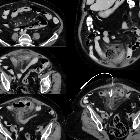Jejunoileal diverticulitis

















Jejunoileal diverticulitis (plural diverticulitides), an acute inflammation of diverticula of the jejunum or ileum is much rarer than colonic diverticulitis.
Epidemiology
The jejunum is a more common site of acquired diverticula of the small bowel than the ileum .
Clinical presentation
Diverticulosis of the jejunum and ileum are generally asymptomatic.
If these diverticula become acutely inflamed or even perforate or bleed, then symptoms usually manifest. Indeed, terminal ileal diverticulitis is a rare mimic of acute appendicitis.
- acute abdominal pain
- fever
- nausea and vomiting
- leukocytosis
- peritonitis
Radiographic features
The features of jejunoileal diverticulitis are similar to those seen with inflamed diverticula of the large bowel.
CT/MRI
- inflamed jejunal/ileal diverticulum
- thickened and enhancing diverticular wall
- peridiverticular mesenteric fat stranding
- acute inflamed adjacent small bowel
- thickened and enhancing bowel wall
- mesenteric fat stranding
- reactive local nodal enlargement
- non-inflamed diverticula of the small bowel elsewhere
Treatment and prognosis
Due to the rarity of the diagnosis, an optimal therapeutic strategy is not known. In one large study of 346 patients with right-sided diverticulitis, only 9 of these were acute ileal diverticulitis, and these were all successfully managed conservatively. No recurrence was reported .
Siehe auch:

 Assoziationen und Differentialdiagnosen zu Dünndarmdivertikulitis:
Assoziationen und Differentialdiagnosen zu Dünndarmdivertikulitis:



